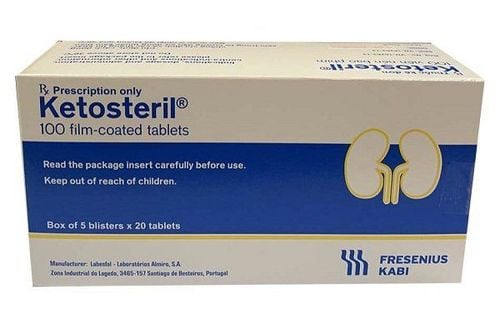This is an automatically translated article.
Blood calcium test is a common method applied to patients with symptoms related to blood calcium disorders. A total blood calcium test can help check calcium levels in the body, thereby helping to diagnose and detect many important medical conditions.
1. What is blood calcium?
Calcium is an essential mineral of the body that plays an important role in many activities such as muscle contraction, nerve transmission, and the release of hormones into the blood. The amount of calcium stored in the body is maintained stably through eating, absorption in the intestines and excretion in the urine and gastrointestinal tract. In the blood calcium will be stored in two main forms:
Inactive form: bound to proteins (mainly albumin): accounting for 50% of circulating calcium in the blood. Free form: not bound to proteins, accounts for nearly half of the blood calcium So total blood calcium consists of total free calcium and inactive calcium. Changes in serum protein levels will affect serum calcium levels, but only changes in ionized calcium concentrations will cause clinical signs.
2. What is the blood calcium test for?
The essence of the blood calcium test is to measure the amount of free calcium present in the body. The purpose of the test is to provide information regarding parathyroid gland function and calcium metabolism in the body. The test is the basis for monitoring a variety of related medical conditions such as: protein and vitamin D disorders, bone, kidney, parathyroid and gastrointestinal diseases.
The test is also used to evaluate malignancies where calcium-releasing cancer cells often cause hypercalcemia. In addition, the ionized calcium test is specifically used for cases of increased or decreased serum calcium levels but borderline levels of total calcium and changes in serum protein levels. Note that blood calcium levels do not accurately reflect how much calcium is in the bones, but only how much calcium is circulating in the blood.
3. Meaning of the results of the total blood calcium test:
Normal values of serum calcium in blood tests are as follows:
Total calcium: 2.1-2.6 mmol/L Ionized calcium: 1.15-1.3 mmol/L Cases of hypercalcemia Total blood counts above normal may include:
Primary hyperparathyroidism Breast, lung, kidney cancer Granulomatous tumors such as sarcoidose, tuberculosis, eosinophilic granulomatosis Side effects of medications : vitamin D and vitamin A poisoning, abuse of gastric acid-neutralizing drugs, excessive use of thiazide diuretics Paget's disease Post-renal transplant patients Respiratory acidosis Leukemia patients Endocrine diseases: thyrotoxicosis, adenomas parathyroid, cushing's syndrome, adrenal myeloma. Cases of hypocalcemia in comparison to normal values may include:
Hypoproteinemia, especially when blood albumin levels are low Reduced calcium absorption: alcoholism, diarrhea Severe malnutrition Renal failure Syndrome Vitamin D deficiency Hypoparathyroidism, pseudohypoparathyroidism Acute pancreatitis Medullary thyroid carcinoma Massive blood transfusion Rickets or osteomalacia Metastases of osteoblastoma
4. Factors that can affect blood calcium test results:
There are factors that affect test results including:
Vitamin D poisoning or drinking too much milk can increase calcium Lower serum pH causes calcium elevation Prolonged tourniquet time lowers pH and increases calcium concentration . Hypoalbuminemia associated with decreased total calcium Use of drugs that increase serum calcium such as: alkaline antacids, androgens, calcium salts, parathyroid hormone (PTH), thiazide diuretics, thyroid hormone and vitamin D. Use of drugs that reduce serum calcium such as: acetazolamide, anticonvulsants, aspirin, calcitonin, corticosteroids, diuretics, estrogens, laxatives, oral contraceptives
Please dial HOTLINE for more information or register for an appointment HERE. Download MyVinmec app to make appointments faster and to manage your bookings easily.













